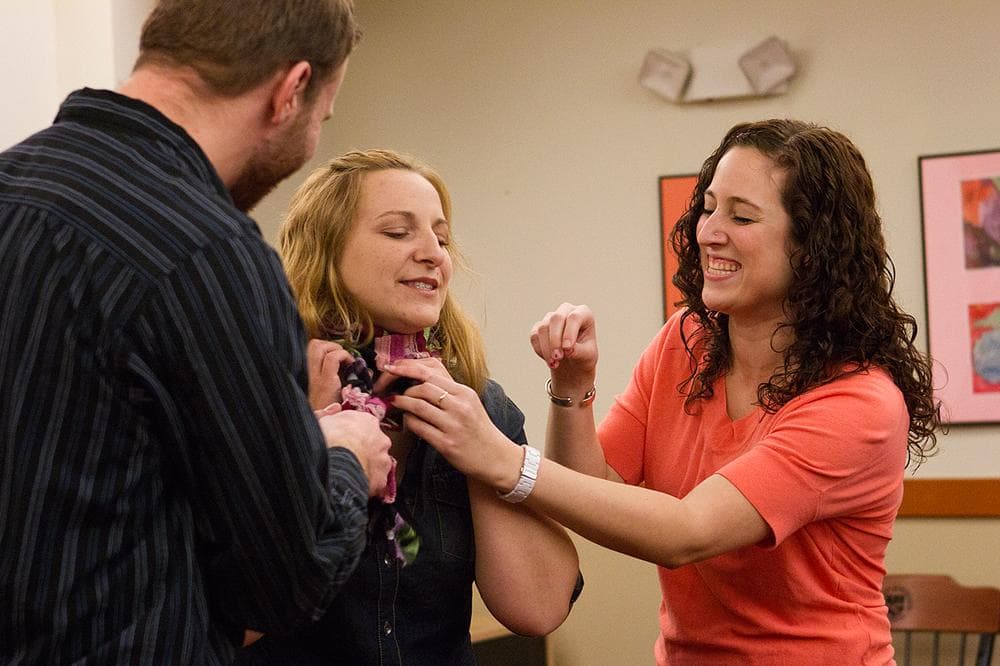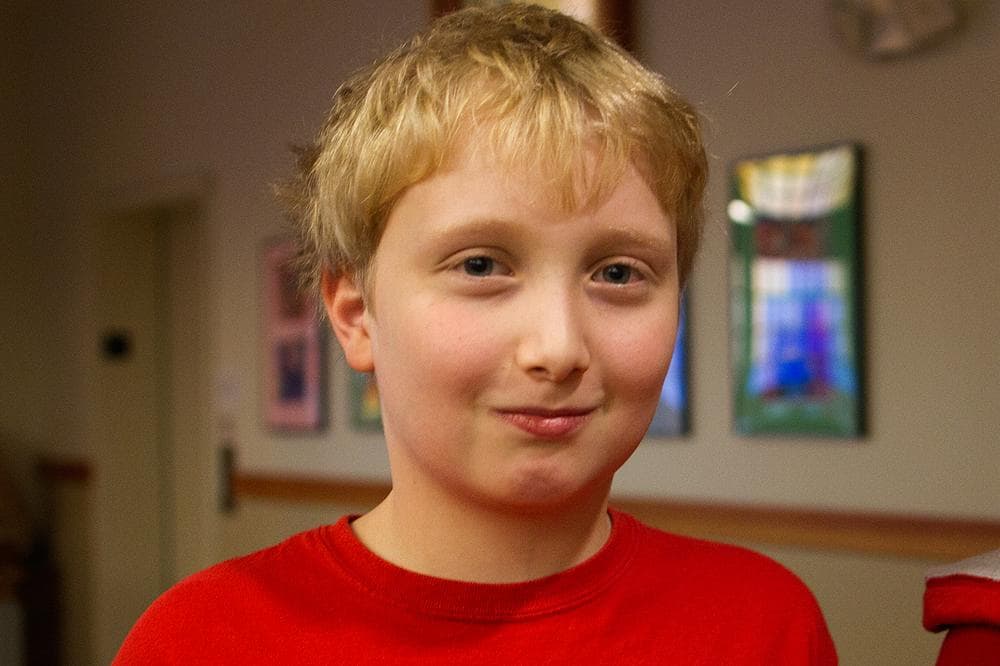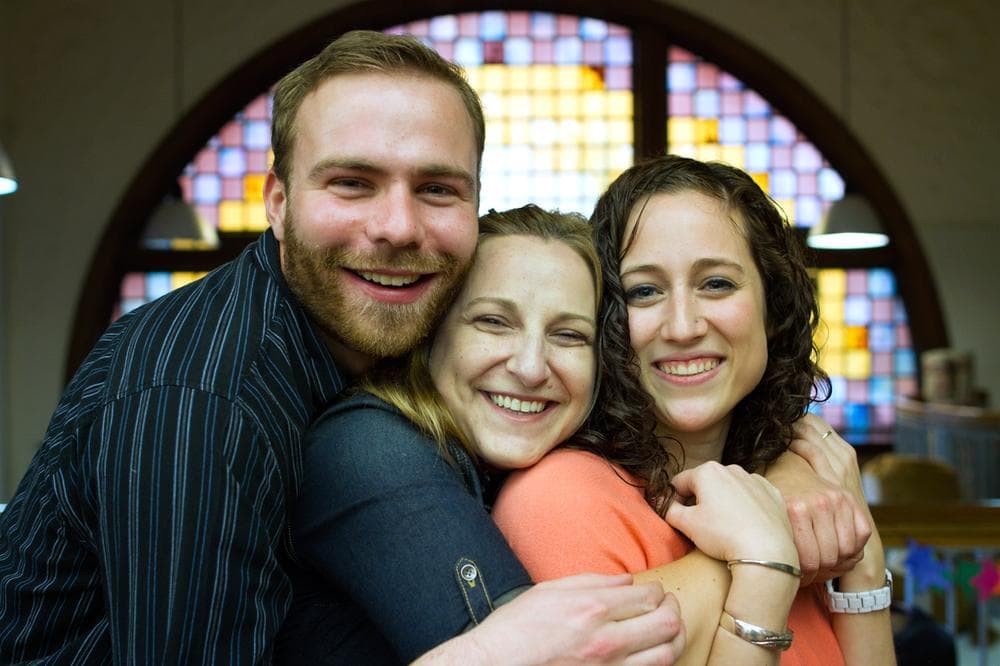Advertisement
Troupe Asks: What's Funny About Bullying?
Resumehttp://www.youtube.com/watch?v=ues-O-5OoBk
Bullying. Parents, schools and, most importantly, kids struggle with this common, ugly, dangerous issue every day. It's hard to spot and talk about, but ImprovBoston, a comedy club, wants to nip bullying behaviors in the bud by taking humor-based workshops into Massachusetts schools.
'Those Things Shouldn’t Go Together'
Improv comedian Deana Tolliver performs in front of a roomful of adults a few times a week. On this day, though, she greets a younger, more fidgety crowd at the Kingsley Montessori School in Boston.
“Good morning, everyone, how are you?” she asks warmly. The kids sitting Indian style on the floor quietly respond, “Good."
Tolliver is director of education at ImprovBoston in Cambridge's Central Square. She's also the driving force behind a novel approach to the topic of bullying.
“I totally understand the eyebrow that we get when I first talk about it — we’re going to use comedy to talk about bullying with second graders — that seems like a ridiculous thing, those things shouldn’t go together,” Tolliver says.
"We keep going, that moment of, ‘This is uncomfortable, <em>this is not OK</em>' is what we need those kids to see.”
ImprovBoston's Deana Tolliver
So, how — and why — do they? As Tolliver explains it, we humans are programmed to laugh.
“You might hear someone making fun of someone and you might think, ‘You know what? That was funny. That’s a good one.' I mean, we’ve all said that, right? And as adults, man, how often do we offhandedly make a remark that is funny — and it’s probably at someone else’s expense? The youngest kids that we work with are already learning to do that.”
Tolliver wants these elementary school kids to think twice about doing that in the future. She and two other actors from the club use the tenets of improv to get that across.
On stage improvisers roll without scripts, which forces them to fully trust and support each other. In this business this fundamental concept is known as “Yes, and…” — meaning the actors have to agree to each other’s idea and add on to it.
It’s a handy life tool, according to Tolliver. She’s even taught it to CEOs. Here she tells the schoolchildren, “If we can do that, then this thing where people are bullying each other or picking on each other won’t have a chance to grow because we’ve all decided to support one another.”
Then Tolliver asks, “So who can tell me what bullying is?”
Hands shoot up. Kids use words like "being mean" and "teasing." Then Tolliver and her team improvise a brutal scene to show, rather than tell, these third, fourth, fifth and sixth graders what bullying can be like.
An Ugly Exercise In Bullying
One unlucky actor is assigned the role of victim, “and then we really work hard to tear that person down in front of the kids,” Tolliver explains, to the point of where she’s had dear friends reduced to tears in this workshop. “We always preface that exercise by saying we hate it,” she continues, “and that’s it the hardest thing we have to do, but we think it’s important to show the kids how that feels.”

The dreaded exercise starts with a greeting. Tolliver and ImprovBoston actor Bryce Read stand next to each other to face their peer, Emily Holland. Things quickly turn snarky as two gang up on one to shred the color of Holland's sweater.
“You look like a walking peach,” Read quips.
"I was going to say a floppy salmon,” Tolliver adds.
Then they go on to make fun of Holland’s shoes.
“Who do you think you are, Pocahontas or something? Did you make those?”
Some of the kids giggle. Tolliver says that always happens.
“When we start this bullying exercise you’ll hear the kids, even the littlest ones, laughing at first because they don’t know what else to do," she says.
But as things amp up there's a palpable shift.
“And we don’t stop," Tolliver says, "like, we keep going, that moment of, 'This is uncomfortable, this is not OK' is what we need those kids to see.”
Then Read and Tolliver taunt their "friend" about her watch, ultimately ripping it off her arm and calling her “big nose” before they exit the scene.
It's an ugly, emotional ride. And the kids get it. As soon as the scene is over, Tolliver and Read hug their friend Holland and apologize.
Will The Workshop Work?

Tolliver replays this painful scenario over and over again in schools, but also for personal reasons. She was motivated to create the improv bullying workshops in 2005 when one of her own children became a victim. “I hate to use the word victim, it sounds so serious,” she admits.
She also hates the word "bully." After hours of research and reflection on the problem of bullying, Tolliver has come to this conclusion:
“No child wakes up in the morning and decides, 'I’m going to go to school and be mean today.' I believe that every child means to do the right thing, wants to do the right thing, but circumstances get out of their control. So a lot of our program is about recognizing when you've made a mistake and how you can backtrack from that.”
An apology is a great start for kids this age. And knowing that saying — "Stop, I don't like that” — might actually work. Tolliver says elementary school students often don't recognize that they're acting like bullies — or even that they're being bullied. That's how it was last year for 11-year-old Max Ellsworth, a sixth grader at the Kingsley school.
“I think at that time I didn't realize that it was such a serious issue," Max says. "And I wasn't sure how to deal with it because the first thing you want to do is insult them back because no one likes going to the teachers. So it's sometimes very hard to think of what to do next.”
And Max admits he's a bit nervous about middle school. Looking ahead, I ask if he thinks what he's learned in the workshop will help. After a brief pause he says, “Maybe,” followed by some hesitant laughter. “I'm not sure. I think it really depends, once when I get there I'll see because it will be so different than anything I've ever experienced.”

Tolliver recognizes how bullying can increase exponentially in middle and high school. To deal with that, ImprovBoston customizes (or improvises) their workshops for each grade level and individual situation. Remembering the 2010 suicide of South Hadley bullying victim Phoebe Prince, Tolliver hopes her workshops will help prevent future tragedies from happening.
“To feel like a child is so on their own that they feel like they have no one to turn to and no place to go, and that that is what they resort to, we have all failed as a society,” she believes.
As a tonic for the brutal exercise these elementary school all just endured, Tolliver asks the kids to work together with the actors to create a new superhero. One boy suggests this hero should be a mega superhero. When asked what his name should be, he takes a beat before answering, “Big Man!” and the entire room erupts with laughter, applause and cheers.
The workshops are booked through Young Audiences of Massachusetts, a nonprofit dedicated to the healing power of the arts.
This program aired on November 28, 2011.
